21 Best help desk software to streamline support in 2026
Sneha Arunachalam .
Nov 2025 .

Quick summary: Top help desk software
This blog breaks down the top help desk software solutions and what makes each one stand out for modern customer support teams.
1. SparrowDesk – AI-powered help desk with 60% auto-resolution and omnichannel inbox, perfect for fast-growing teams.
2. Zendesk – Enterprise-grade platform with deep integrations and 80%+ AI interaction handling.
3. Freshdesk – User-friendly, AI-driven help desk that speeds up responses by up to 40%.
4. Zoho Desk – Affordable, customizable, and ideal for SMBs—especially Zoho ecosystem users.
5. Help Scout – Email-style simplicity with AI Answers and a collaborative shared inbox.
6. Intercom – Conversational support with Fin AI Agent and proactive engagement tools.
7. HappyFox – Scalable, automation-rich platform built for agile and growing teams.
8. LiveAgent – All-in-one multichannel help desk with built-in live chat and call center.
9. Monday Service – Visual, workflow-driven ticketing integrated within monday.com’s ecosystem.
10. Salesforce Service Cloud – Enterprise powerhouse with predictive Agentforce AI for large organizations.
11. Hiver – Turns Gmail into a shared inbox hub for small teams managing customer emails.
12. SAAS First – AI-first, affordable help desk tailored for SaaS startups and SMBs.
13. Tidio – Combines live chat and AI to automate 67% of repetitive customer queries.
14. SuperOps – Unified PSA + RMM for MSPs and IT teams managing endpoints.
15. BoldDesk – Affordable, modern help desk with AI ticketing and deep customization.
16. SysAid – ITSM-ready platform offering on-premise or cloud options for complex IT environments.
17. HubSpot Service Hub – Seamless CRM-connected support solution ideal for marketing-aligned teams.
18. Jira Service Management – ITSM-focused help desk integrating with Agile and DevOps workflows.
19. Front – Collaboration-first help desk that unifies team inboxes and workflows.
20. InvGate Service Management – AI-driven ITSM tool with ticket summaries and smart automation.
21. Desk365 – Microsoft 365-native help desk built for small to mid-sized businesses.
The best help desk software isn't one-size-fits-all—it's the platform that fits your team's workflow and grows with your business. Every support interaction is a chance to build or lose customer trust. Test platforms with your actual team through free trials to find the solution that makes support smoother for everyone involved.
Customers won’t wait—why should your help desk?
Today’s customers expect real-time support, but not every tool can keep up. We’ve rounded up the most reliable, efficient, and easy-to-use help desk solutions—covering the features that matter and helping you choose a platform that actually delivers results.
So let’s jump straight into the top help desk tools that truly stand out.
- SparrowDesk- AI-powered, affordable omnichannel support.
- Zendesk- Enterprise-ready, scalable help desk.
- Freshdesk- Flexible, multichannel customer support
- Zoho Desk- Best for teams relying on the broader Zoho app suite.
- Help Scout- SaaS and ecommerce needing simplicity.
- Intercom- Instant, automated in-app customer conversations.
- HappyFox- Clean, centralized ticketing for growing teams.
- LiveAgent- Real-time chat and multichannel responsiveness.
- Monday Service- Support teams working inside monday.com
- Salesforce Service Cloud- CRM-driven enterprise support workflows.
- Hiver- Support teams operating directly from Gmail.
- SAAS First- SaaS teams wanting fast, plug-and-play AI chat.
- Tidio- Small online stores needing automated chat support.
- SuperOps- MSPs managing clients and service delivery.
- BoldDesk- SMBs needing a modern, affordable help desk.
- SysAid- IT teams managing full ITSM and assets.
- HubSpot Service Hub- Support aligned with CRM, sales, and marketing.
- Jira Service Management- DevOps and IT teams running agile workflows.
- Front- Teams needing collaborative, high-touch communication.
- InvGate Service Management- Mid–large orgs streamlining ITSM with automation.
- Desk365- Companies working entirely on Microsoft 365.
Now, let’s break down each help desk solution in detail.
1. SparrowDesk
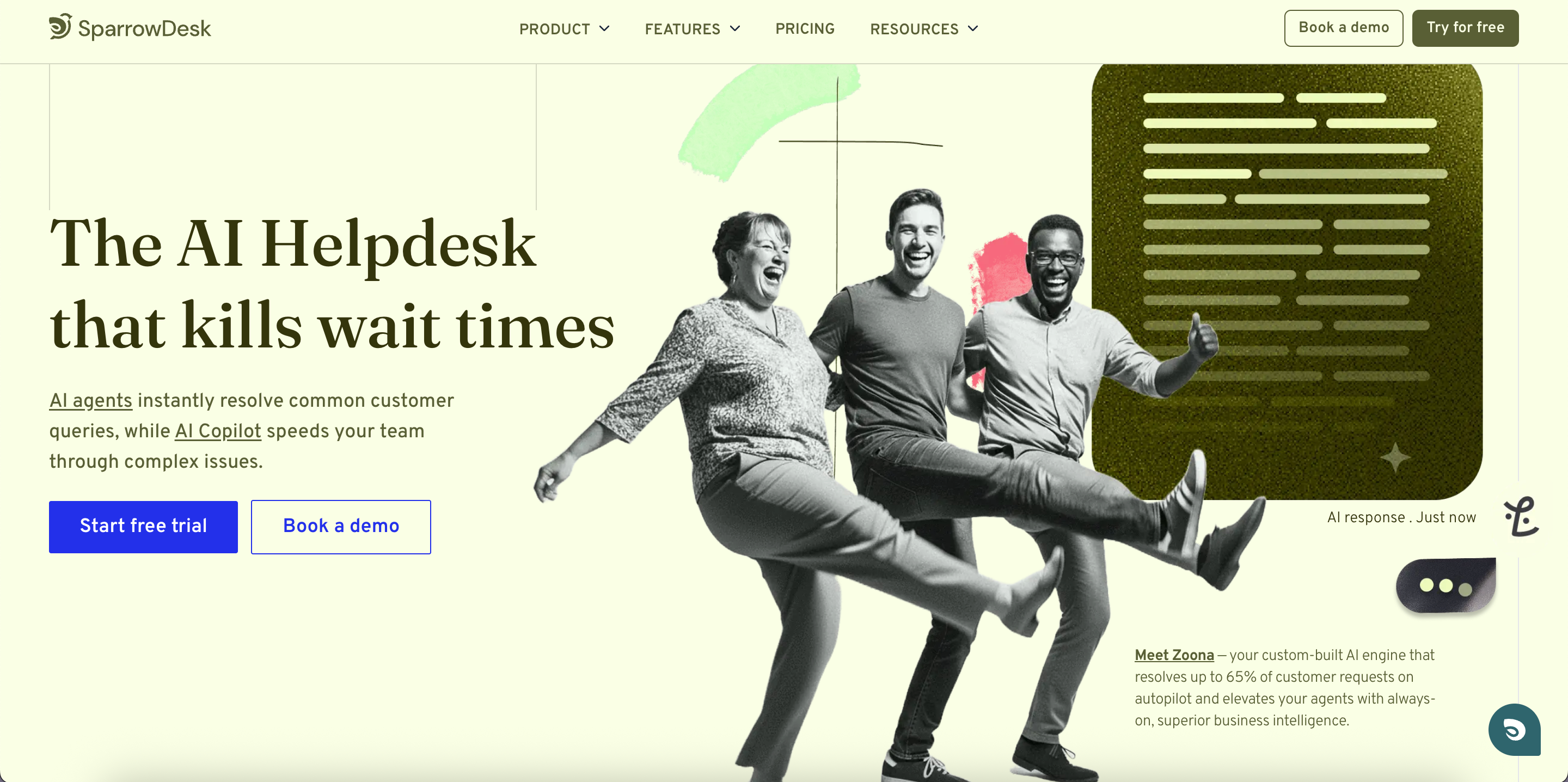
SparrowDesk is an AI-powered help desk software built for modern customer service teams that want to deliver faster, more personalized support—without the chaos.
With ticketing, live chat, help center and automation under one roof, SparrowDesk gives you a complete, intelligent support system that scales effortlessly as your business grows.
A modern help desk for 2026: SparrowDesk.
Why SparrowDesk?
Because speed and personalization shouldn’t come at the cost of simplicity.
SparrowDesk helps teams resolve more queries in less time, automate repetitive tasks, and create a connected support experience customers actually love.
Key features of SparrowDesk
- AI Agents (Up to 60% Auto-Resolution): Let AI handle repetitive queries so your agents can focus on what matters. SparrowDesk’s AI agents can automatically resolve up to 60% of incoming customer requests, adapting to your brand tone and escalating only when needed.
- Omnichannel inbox: Manage every conversation (email & live chat) from one shared inbox. No tab switching, no confusion—just streamlined communication in real time.
- AI Copilot for Agents: Supercharge agent productivity with AI-powered summaries, suggested replies, and instant knowledge lookups. Agents spend less time searching and more time solving.
- Smart ticketing & SLAs: Automatically categorize, prioritize, and assign tickets while tracking SLAs to ensure every response is timely and on-brand.
- Self-Service portal: Create a branded, searchable knowledge base that empowers customers to find answers on their own—reducing ticket volume and improving satisfaction.
- Branded, multilingual Live Chat: Deliver instant, personalized support across multiple languages with a fully customizable live chat widget designed to feel like part of your brand.
- Advanced analytics: Make data-driven decisions with real-time dashboards that highlight team performance, ticket trends, and customer satisfaction—all in one place.
Built for modern support teams — SparrowDesk
SparrowDesk pricing
This help desk management software is simple, seat-based pricing with flexible AI add-ons—no hidden costs, no surprises.
Plan | Annual Billing (per agent/month) | Billed Monthly (per agent/month) |
|---|---|---|
Starter | $16 | $19 |
Professional | $49 | $59 |
Enterprise | $89 | $99 |
- AI Add-ons:
- Luna AI Agent: $0.70 per resolution — auto-resolves customer queries using AI.
- AI Copilot: $16/seat/month — empowers agents with AI summaries, suggested replies, and next steps.
All plans include a 14-day free trial, transparent pricing, and the flexibility to scale as your support needs evolve.
Explore more details on SparrowDesk’s pricing page.
SparrowDesk pros & cons
Pros
- Simple setup: Go live in hours, not weeks.
- Scales effortlessly: Grow without migrations or disruptions.
- Easy-to-use interface: Built for teams of all technical levels.
- Faster resolutions: Teams solve queries up to 60% faster with AI automation.
Cons:
- Some advanced features under higher-tier plans.
- Limited third-party integrations (currently expanding).
SparrowDesk ideal for

SparrowDesk is designed for modern, growing teams that want to simplify customer support while staying efficient and customer-focused.
- Startups and SMBs seeking a powerful yet affordable help desk solution.
- Businesses that want AI to handle repetitive customer queries automatically.
- Teams managing multiple support channels like email, chat, and social media.
- Organizations looking for quick setup and minimal agent training.
- Companies that need real-time insights and automation-driven efficiency.
Streamline support with SparrowDesk
Quick overview of SparrowDesk
2. Zendesk
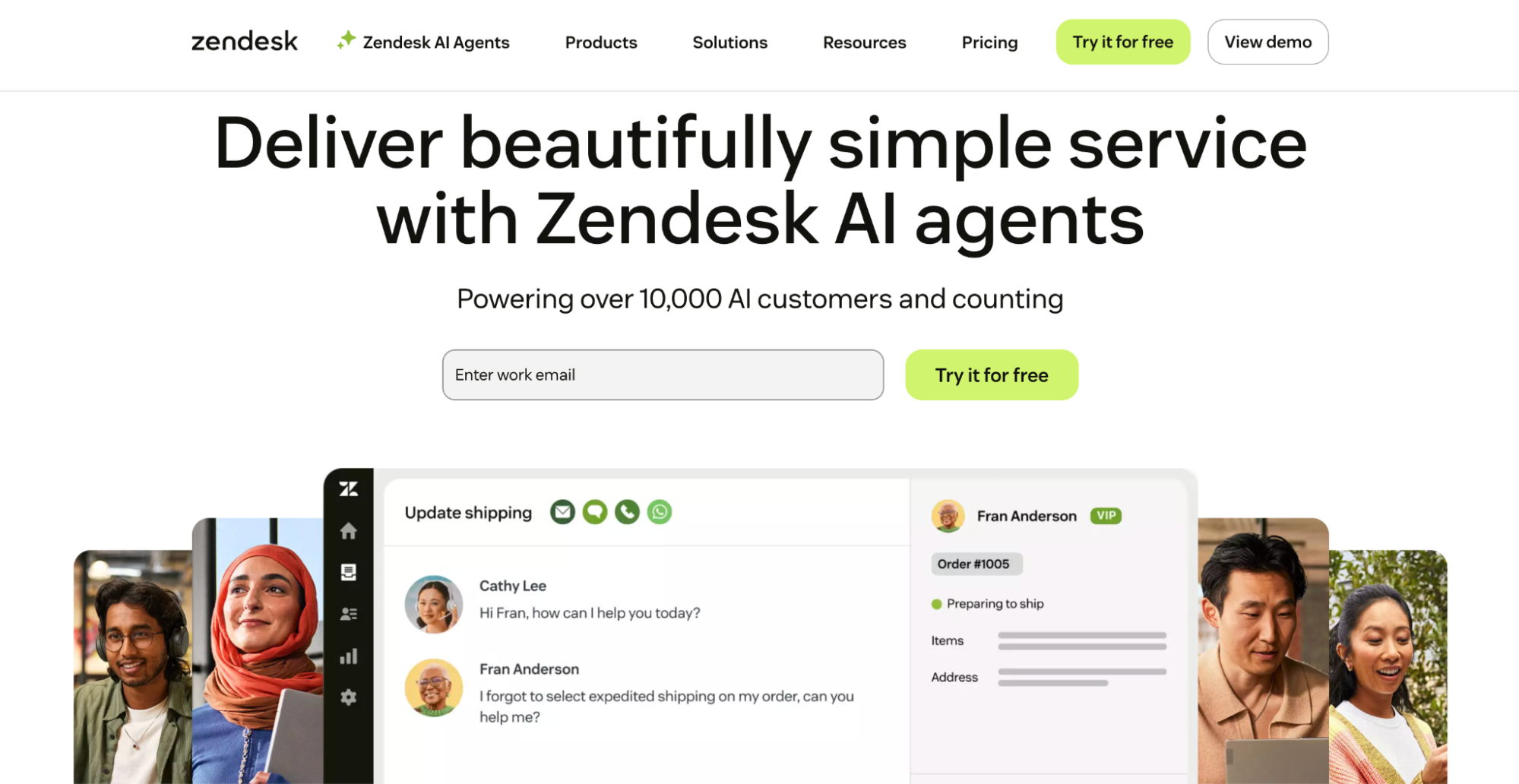
Zendesk is a leading help desk solution designed for mid-sized to large organizations. This help desk management software offers a comprehensive suite for omnichannel support, automation, and advanced analytics. The platform is renowned for its reliability, integration ecosystem, and robust workflow customization. Zendesk is widely adopted by enterprises needing scalable and secure support operations
Zendesk key features
- Unified Ticketing System - Brings together customer requests from email, chat, phone, and social media in one dashboard
- Omnichannel Support - Makes managing different communication channels simple
- AI Agents - Takes care of over 80% of service interactions and cuts down resolution times
- Help Center - Lets you build custom knowledge bases and self-service portals
- Advanced Analytics - Provides 20+ ready-to-use reports and dashboards to track metrics
Zendesk pros and cons
Pros:
- Complete customer support ticketing system with tools for team collaboration
- Rich customization options with 700+ integrations
- In-depth reporting and analytics tools
- Adaptable for businesses of all sizes
Cons:
- New users face a challenging learning curve
- Premium plans cost more than average and gate many features
- Customer support quality varies
- Setting up automations and workflows can be tricky
Zendesk pricing
Plan | Monthly Price | Annual Price |
Suite Team | $69/agent | $55/agent |
Suite Professional | $149/agent | $115/agent |
Suite Enterprise | $219/agent | $169/agent |
Zendesk best for
Large enterprises with dedicated admins will find Zendesk particularly valuable. The platform shines when managing high volumes of support requests across multiple channels.
Zendesk free trial details
The 14-day free trial lets you test all Suite Professional features without a credit card. You'll get access to setup guides for messaging, knowledge base, AI agents, and analytics.
If Zendesk feels too complex or expensive for your team, SparrowDesk offers a simpler, AI-first help desk with faster setup, built-in automation, and transparent pricing without the learning curve that comes with enterprise tools.
Explore a simpler alternative to Zendesk
3. Freshdesk
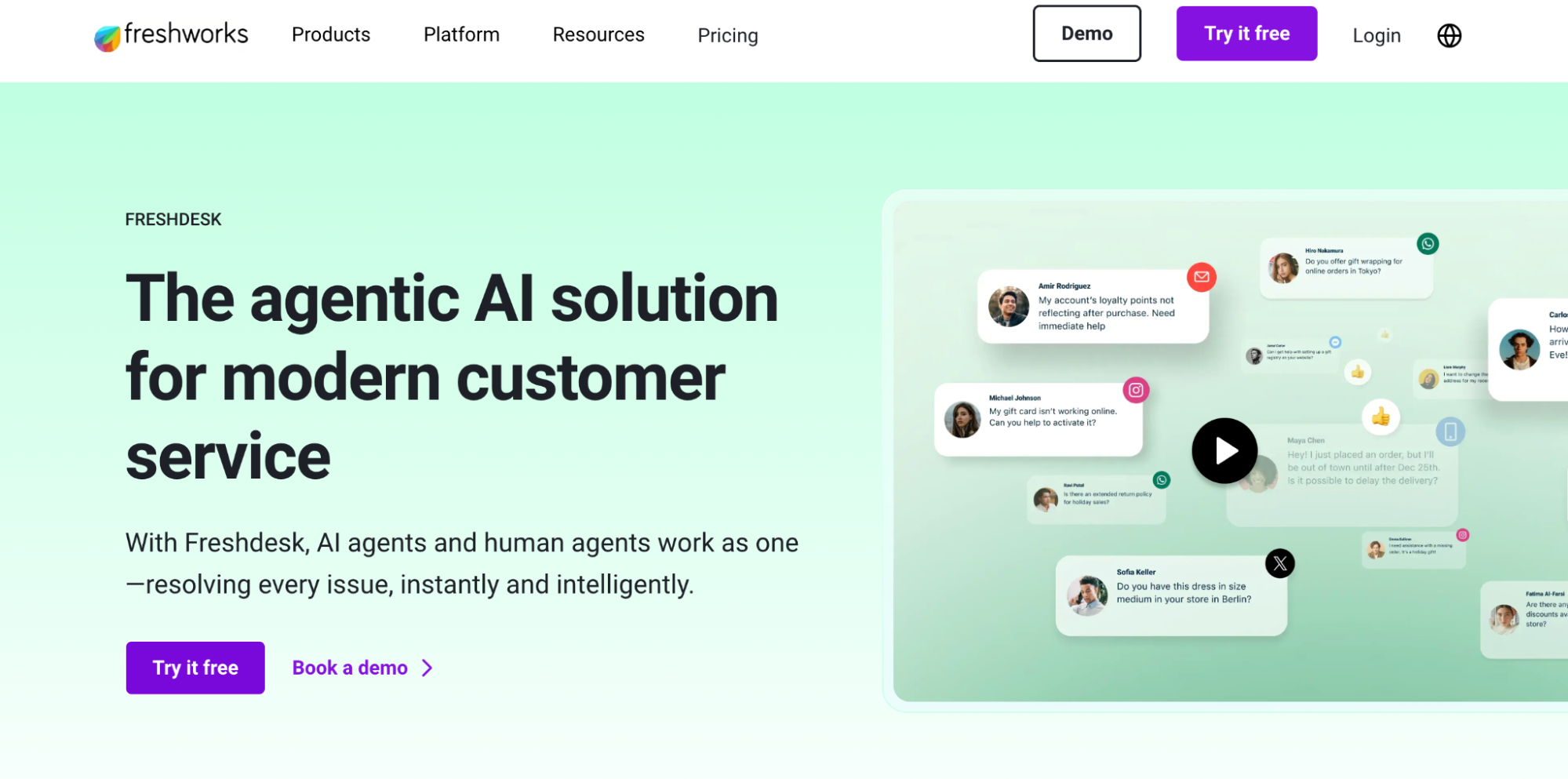
Freshdesk is a popular help desk software designed to help teams manage customer inquiries efficiently across multiple channels. With its AI-powered ticketing system, Freshdesk streamlines how businesses handle large volumes of support requests, without sacrificing response quality or speed. This help desk solution brings together email, chat, phone, and social media support, making it easier for teams to deliver consistent, personalized customer experiences from one place.
Note: If you’re comparing tools, it’s worth noting that Freshservice ticketing offers a similar structured approach for IT service management, while Freshdesk focuses more on external customer support needs.
Freshservice ticketing and Freshdesk both share automation and workflow capabilities, but Freshdesk remains the go-to option for businesses that want to unify all customer interactions under one platform.
Freshdesk key features
Freshdesk provides reliable features that boost support team output:
- Unified Agent Workspace - Centrally manages customer interactions from email, chat, phone, and social channels in one location
- Ticket Dispatch - Automates ticket categorization, prioritization, and assignment to appropriate agents
- Helpdesk AI - Equips agents with Freddy AI Copilot that suggests responses, flags sentiment, and cuts response time by up to 40%
- Skill-Based Routing - Sends questions to agents with matching expertise to resolve issues faster
- Custom Real-Time Dashboards - Shows key metrics for informed decision making
Freshdesk pros and cons
Pros:
- User-friendly help desk software for small business and growing teams that’s easy to set up and scale.
- Central hub for all communications with automation to handle sudden volume increases
- Quick ticket routing, responses, and optimized processes to boost agent efficiency
- Outstanding migration and onboarding support ensures smooth implementation
Cons:
- Some features need extra training and setup time
- Tools like Outlook can create duplicate tickets that need manual merging
- Platform speed and adaptability could improve for large operations
- Limited advanced reporting options compared to competitors
Freshdesk pricing
Plan | Monthly Billing | Annual Billing |
Free | $0 (up to 2 agents) | $0 (up to 2 agents) |
Growth | $18/agent/month | $15/agent/month |
Pro | $59/agent/month | $49/agent/month |
Pro + AI Copilot | $94/agent/month | $78/agent/month |
Enterprise | $95/agent/month | $79/agent/month |
You can save up to 17% with annual billing.
Freshdesk best for
Small, mid-sized, and enterprise businesses looking for a flexible help desk with multichannel support will find Freshdesk ideal. Teams handling high volumes of customer questions across different channels will benefit most. The software suits businesses that need detailed ticketing tools and AI assistance to improve response times and customer satisfaction.
Freshdesk free trial details
The 14-day free trial gives you full access to all Enterprise plan features. Starting the trial doesn't require a credit card. You can bring up to two team members to try the platform's features during the trial period.
For detailed breakdown checkout Freshdesk pricing guide
4. Zoho Desk
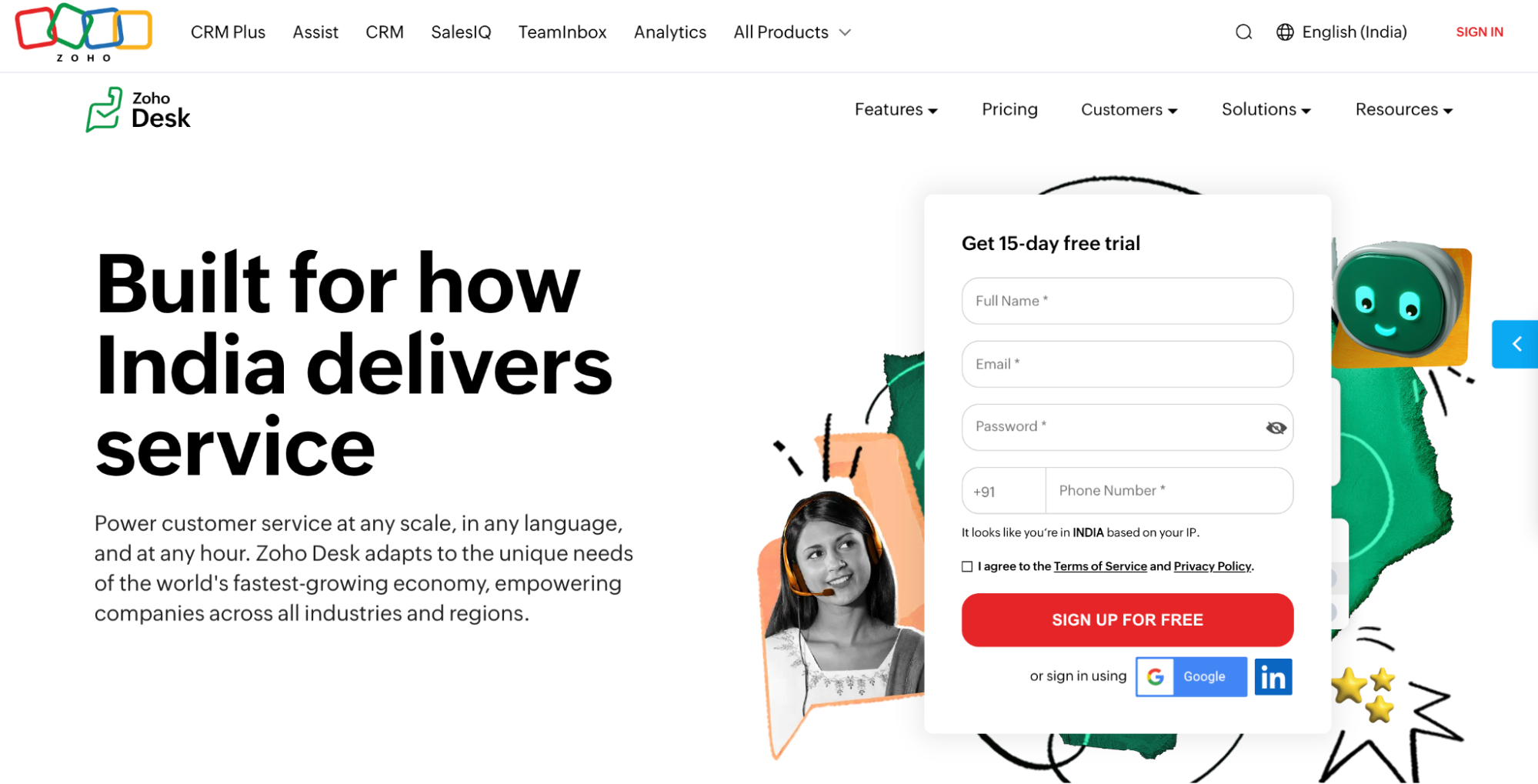
Zoho help desk is a versatile help desk platform best known for its affordability, deep customization, and seamless integration with the Zoho ecosystem. It supports multi-channel ticketing, AI-powered automation, and detailed reporting. Zoho help desk is ideal for startups and SMBs looking for a scalable solution with a gentle learning curve and strong value for money
Zoho Desk key features
- Omnichannel ticketing from email, social media, phone, and live chat
- Zia AI assistant for sentiment analysis and ticket tagging
- Blueprint process automation for simplified processes
- Self-service portal with knowledge management
- Mobile apps for Android and iOS
Zoho Desk pros and cons
Pros:
- Deep integration with Zoho ecosystem
- User-friendly interface and processes
- Better value than competitors
- Detailed automation capabilities
Cons:
- Learning takes time due to feature complexity
- Text-heavy, somewhat dated interface
- Advanced reporting limited to higher-tier plans
- Premium support adds 20-25% to costs
Zoho Desk pricing
Plan | Monthly Price | Annual Price |
Free | $0 (3 agents) | $0 (3 agents) |
Standard | $20/agent | $14/agent |
Professional | $35/agent | $23/agent |
Enterprise | $50/agent | $40/agent |
Zoho Desk best for
Small to mid-sized businesses that need powerful automation and detailed multichannel support will find Zoho help desk particularly useful. Companies already using other Zoho products will benefit the most.
Zoho Desk free trial details
The platform offers a 15-day free trial with full access to all features. Users can test any pricing tier without providing credit card details.
5. Help Scout
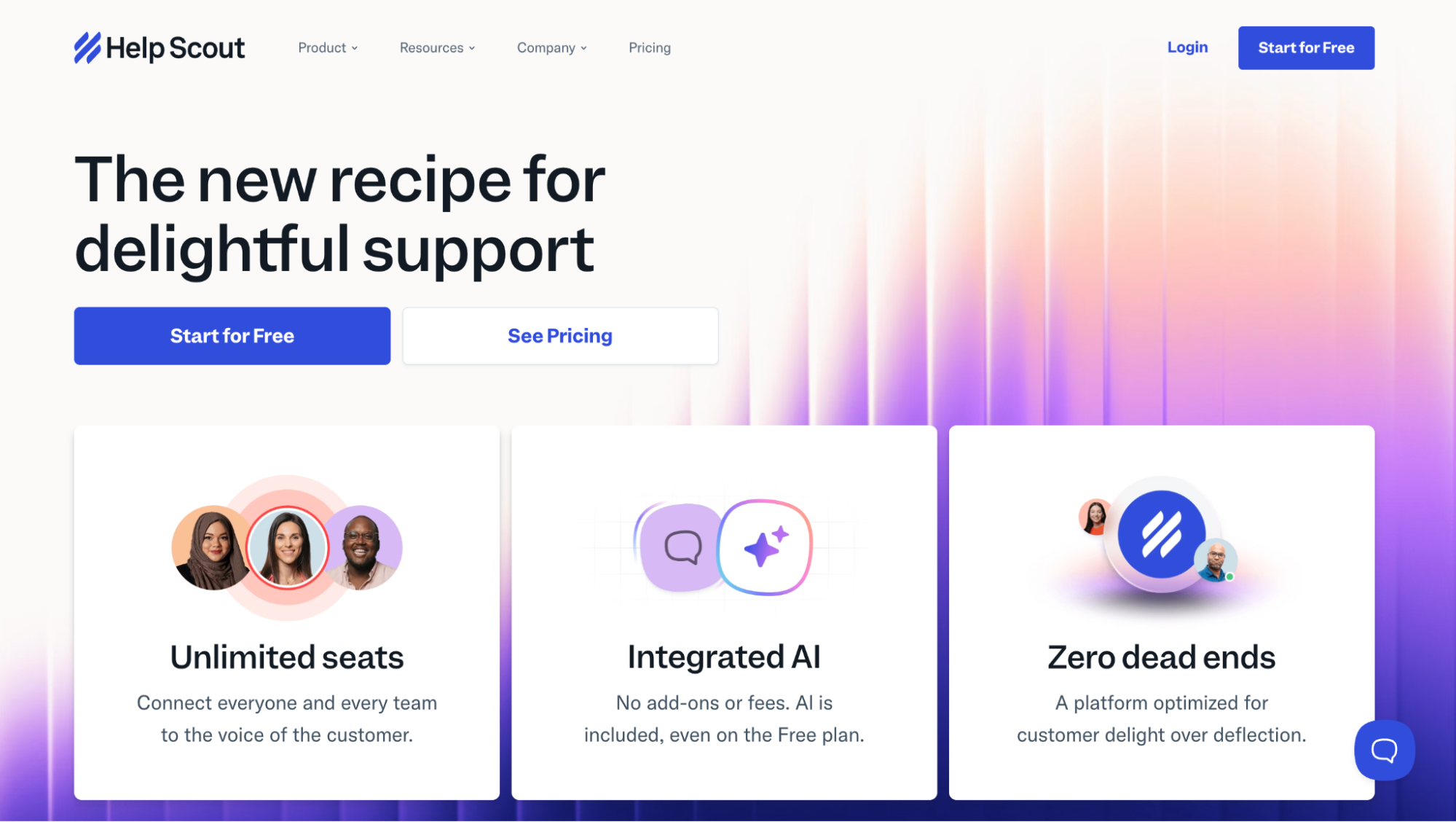
Help Scout is a customer-centric help desk solution designed for teams seeking a clean, collaborative shared inbox, live chat, and knowledge base. Its simple interface and focus on human support make it a favorite among small and medium businesses. Help Scout emphasizes ease of use, team collaboration, and customer satisfaction
Help Scout key features
- Shared Inbox - Manages email, chat, and social media communications in one place
- Beacon Widget - Embeds help on any webpage for instant customer assistance
- Knowledge Base (Docs) - Creates self-service help centers reducing support volume by 30%
- AI Features - Has AI Answers, AI Drafts, AI Summarize, and AI Assist to streamline processes
- Team Collaboration Tools - Has collision detection, internal notes, and @mentions
Help Scout pros and cons
Pros:
- Easy-to-use interface that needs minimal training
- Clean, email-like experience that feels familiar
- Strong collaboration features
Cons:
- Limited advanced customization options
- Simple analytics compared to competitors
- Some features only available in higher-tier plans
- Fewer multichannel options than some alternatives
Help Scout pricing
Plan | Monthly Price | Annual Price (-16%) |
Standard | $30/user | $25/user |
Plus | $54/user | $45/user |
Pro | $90/user | $75/user |
AI Answers add-on available at $0.75 per resolution.
Help Scout best for
Help Scout excels for growing SaaS and ecommerce businesses that need straightforward, individual-specific customer support. Teams moving from email to their first help desk system will find it particularly useful.
Help Scout free trial details
The 15-day free trial provides complete access to all features without requiring a credit card. New users receive a 3-month free trial of AI Answers with unlimited resolutions.
Suggested read: If Help Scout’s simplicity works for you, great — but if you need deeper automation or more scalable pricing, there are stronger fits out there. You can explore them in this quick guide to the best HelpScout alternatives below
👉 Top HelpScout Alternatives for 2026
Help Scout is great for simple, human-first support. But if your team needs stronger automation, AI-driven resolutions, and clearer pricing as volume grows, SparrowDesk offers a more scalable help desk without adding complexity.
Explore SparrowDesk for growing support teams
6. Intercom

Intercom is a help desk software that combines messaging, automation, and support tools in one place. It offers both real-time and asynchronous communication, making it flexible for different types of customer interactions.The interface is clean and modern, but there’s a learning curve for some of the advanced features.It’s used across teams—not just support—often by product and growth teams as well.
Intercom key features
- Fin AI Agent - Advanced AI chatbot that solves customer questions instantly with customized replies
- Centralized Inbox - Brings all channels, tickets, and team communications into one workspace
- Proactive Support Tools - Product tours, surveys, and outbound messaging
- Knowledge Base Integration - Creates self-service options for customers
- Extensive Integration Hub - Works with 450+ apps including Salesforce and HubSpot
Intercom pros and cons
Pros:
- Easy-to-use interface
- Powerful automation capabilities
- Strong multichannel support options
- Detailed AI-driven features
Cons:
- Small businesses might find the pricing expensive
- Advanced features take time to master
- Users report problems with historical data retention
- The interface can feel complex at first
Intercom pricing
Plan | Price (Annual) |
Essential | $29/seat/month |
Advanced | $85/seat/month |
Expert | $132/seat/month |
Fin AI resolutions cost $0.99 each. Additional add-ons are available.
To learn more about Intercom’s pricing, check out our detailed Intercom pricing guide.
Intercom best for
SaaS companies, e-commerce platforms, and startups will find Intercom valuable. The platform helps businesses streamline their support through AI automation while keeping customer engagement immediate.
Intercom free trial details
The 14-day free trial gives you complete access to all features without needing a credit card. You can use Fin AI Agent, Copilot, and Proactive Support Plus without limits during the trial.
Looking for options beyond Intercom? Check out our curated list of Intercom alternatives
7. HappyFox
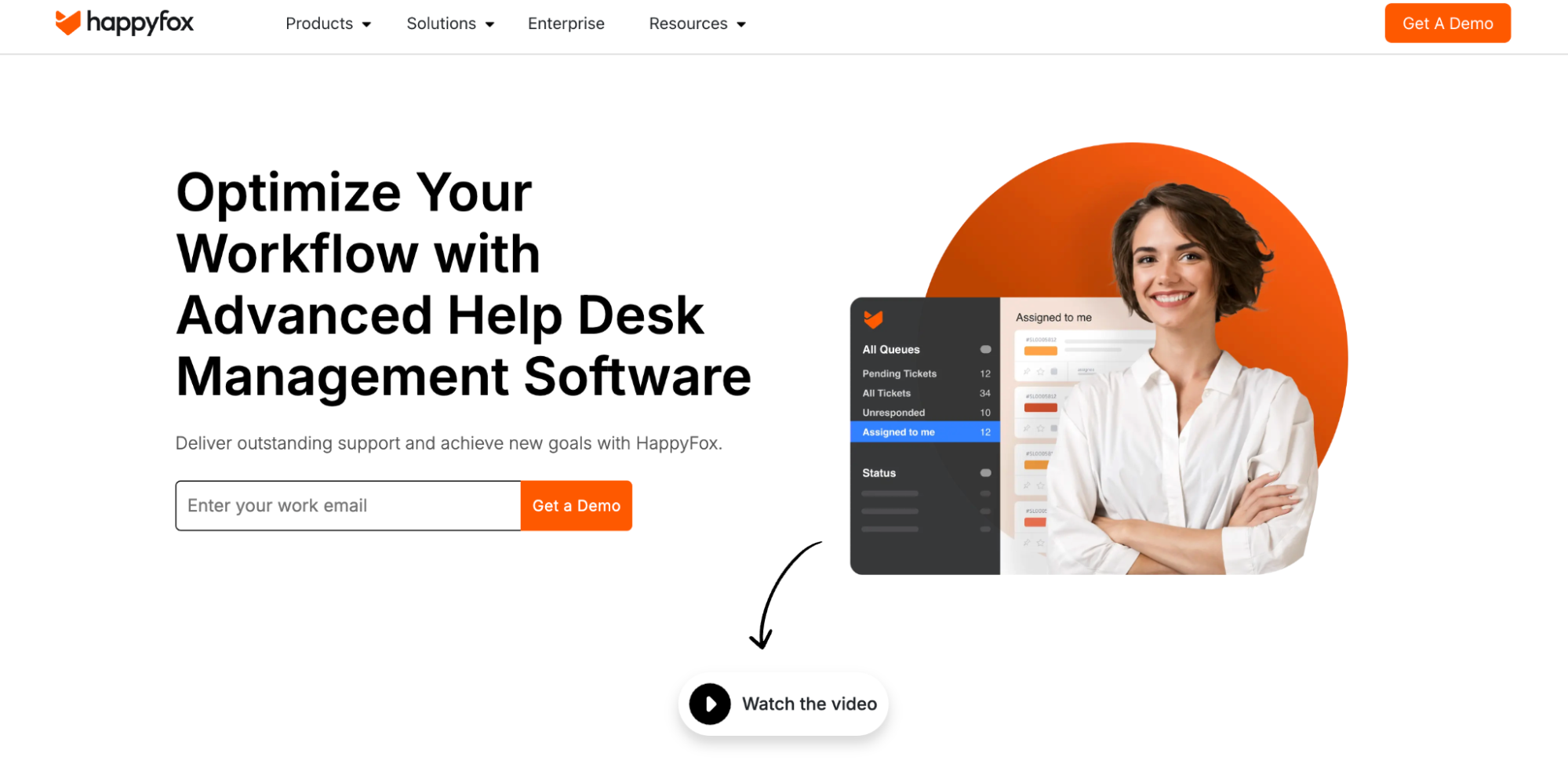
HappyFox is a help desk software that simplifies customer support through omnichannel ticketing, workflow automation, and detailed reporting. It’s built for businesses of all sizes looking to manage high support volumes efficiently while maintaining flexibility and control. With its highly customizable workflows, HappyFox adapts easily to different team structures and industries.
HappyFox key features
- Omnichannel Ticketing: Manage customer queries from email, chat, social media, and phone in one place.
- Smart Automation: Automate repetitive tasks, ticket assignments, and notifications to save time.
- Advanced Reporting: Get actionable insights with performance analytics and custom reports.
- Custom Workflows: Tailor ticket routing, SLAs, and automation rules to fit your business process.
- Self-Service Portal: Create a branded knowledge base for customers to find quick answers.
HappyFox pros and cons
Pros
- Highly customizable with robust automation features.
- Supports multiple channels for unified customer service.
- Strong analytics and reporting capabilities.
- Responsive customer support team.
Cons
- Some advanced features are locked to higher-tier plans.
- Pricing may be steep for smaller businesses.
HappyFox pricing
Plan | Pricing |
|---|---|
Basic | $24 / agent / month |
Team | $49 / agent / month |
Pro | $99 / agent / month |
Enterprise Pro | Contact for pricing |
HappyFox best for
Agile teams and growing organizations that need scalable support, advanced automation, and deep customization to optimize their customer service operations.
HappyFox suits teams that need heavy customization and complex automation.
But if you want a help desk software that’s faster to set up, AI-first, and easier to manage with predictable pricing, SparrowDesk is a simpler alternative.
Explore SparrowDesk help desk software
8. LiveAgent
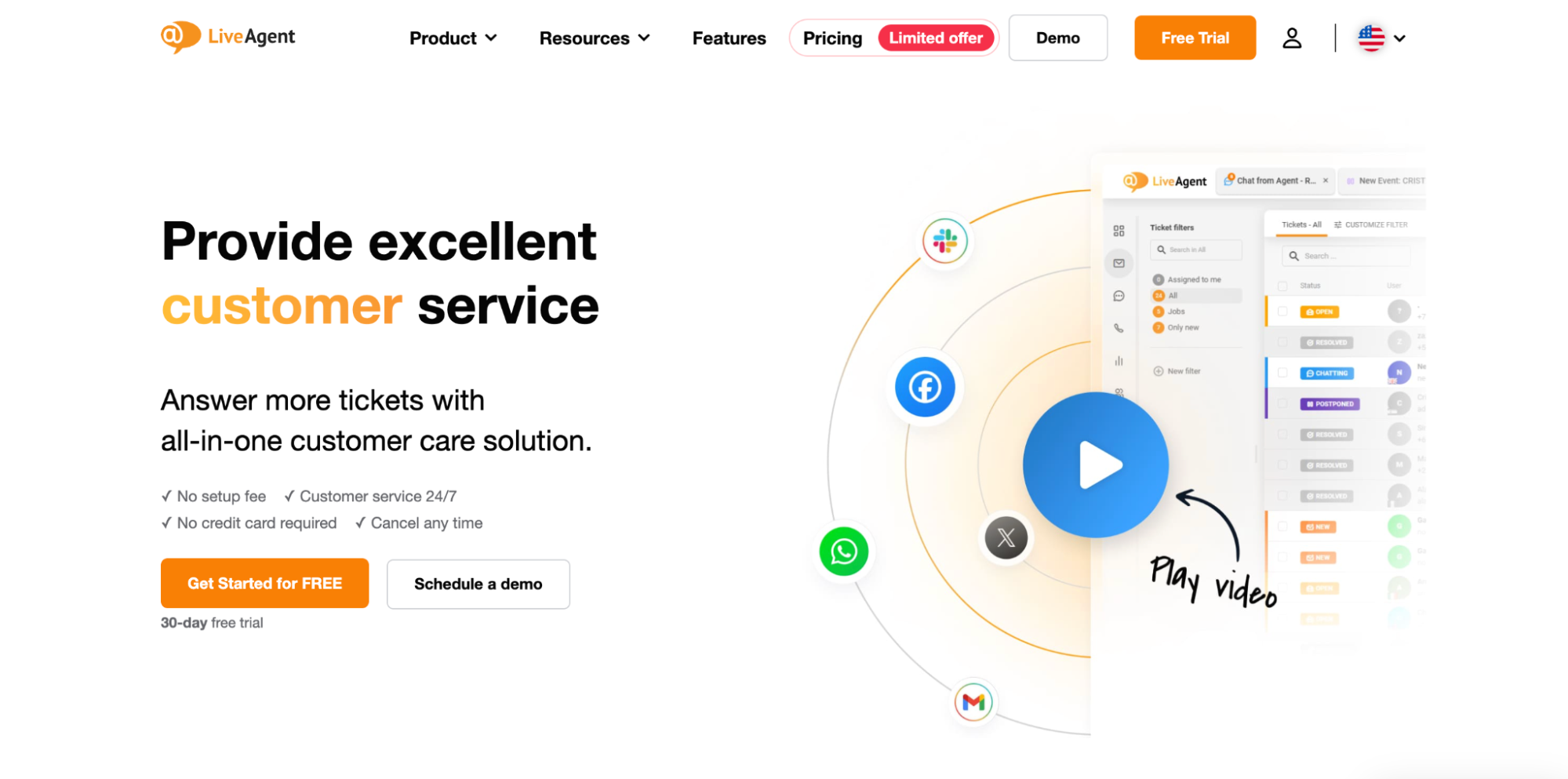
LiveAgent combines all customer communication channels into one unified help desk software solution. The platform turns emails, chats, calls, and social media messages into tickets you can manage with ease.
LiveAgent key features
- Universal inbox that combines all customer communications
- Live chat with typing-view and canned responses
- Built-in call center for inbound/outbound calls
- AI chatbot and answer assistant capabilities
- Customizable knowledge base for self-service
LiveAgent pros and cons
Pros:
- Multiple awards recognize its quick implementation
- Extensive integration options with 200+ connections
- Reliable ticketing system with tagging and automation
- 24/7 customer support availability
Cons:
- Mobile app comes with limited functionality
- The interface can feel overwhelming at first
- Users cannot download attachments in bulk
- Some issues exist with internal calling
LiveAgent pricing
Plan | Monthly | Annual |
Small | $19 | $15 |
Medium | $35 | $29 |
Large | $59 | $49 |
Enterprise | $85 | $69 |
LiveAgent best for
LiveAgent shines for businesses that need multichannel customer support management. Companies that want to bring together communications from live chat, email, calls, and social media will find it perfect for their needs.
LiveAgent free trial details
The 30-day free trial includes all features without asking for your credit card. Personal email users get 14 days, while company email users enjoy a full 30-day trial.
9. Monday service

Monday service combines ticketing capabilities with its project management framework. This combination creates a flexible help desk software solution that transforms reactive service into proactive support. The platform's visual approach to service management differs from traditional ITSM platforms.
Monday service key features
- AI Ticket Triage - The system classifies, sorts, and routes incoming tickets to the right person or department
- Knowledge Base Integration - Agents can quickly access relevant articles to address customer queries
- Customizable Dashboards - The platform tracks performance metrics and ticket statuses live
- Self-Help Options - Customers can solve issues on their own
- Service Portal Builder - Teams can create and manage multiple service portals from a single platform
Monday service pros and cons
Pros:
- User-friendly design needs minimal training
- Combines smoothly with monday.com ecosystem
- Highly flexible and customizable workflows
- Smart automations cut down manual tasks
Cons:
- Lacks native ITSM focus compared to competitors
- Simple SLA tools compared to dedicated solutions
- Advanced features require higher tiers
- Costs can increase as needs grow
Monday service pricing
Plan | Price (Billed Annually) |
Standard | $26/seat/month |
Pro | $38/seat/month |
Enterprise | Custom pricing |
Monday service best for
Monday service excels at delivering service with minimal friction. Teams already using monday.com's project management tools will find it perfect for creating unified workflows across platforms.
Monday service free trial details
The platform offers a 14-day free trial without credit card requirements. Users get complete access to assess all features before making a commitment.
10. Salesforce Service Cloud

Salesforce Service Cloud reshapes the scene of support operations through a unified platform that connects every customer touchpoint. This enterprise-grade help desk software combines AI agents with human support to give customers a consistent service experience.
Salesforce Service Cloud key features
- Unified Agent Workspace - Gives immediate insights and AI recommendations that speed up resolutions
- Agentforce AI - Uses conversational, predictive AI to cut costs and create individual-specific experiences
- Omni-Channel Routing - Distributes cases smartly based on agent availability and skills
- Knowledge Management - Builds centralized digital libraries that agents and customers can use
- Incident Management - Spots potential problems before they become systemic
Salesforce Service Cloud Pros and Cons
Pros:
- Strong automation capabilities
- Wide range of multichannel support options
- Deep AI integration through Agentforce
- Detailed customization options
Cons:
- User interface is hard to learn
- Costs more than other options
- Customization needs heavy investment
- Customers don't use many features fully
Salesforce Service Cloud Pricing
Plan | Price (per user/month) |
Starter Suite | $25 |
Pro Suite | $100 |
Enterprise | $175 |
Unlimited | $350 |
Agentforce 1 Service | $550 |
Salesforce Service Cloud best for
Large enterprises with complex service needs will find Salesforce Service Cloud particularly useful. The platform works best for businesses in regulated industries like telecom, financial services, and healthcare that need adaptable solutions with strong compliance features.
Salesforce Service Cloud free trial details
You can try Service Cloud free for 30 days with full access. The platform needs no downloads or software installation. You don't need a credit card to sign up and test its features.
11. Hiver
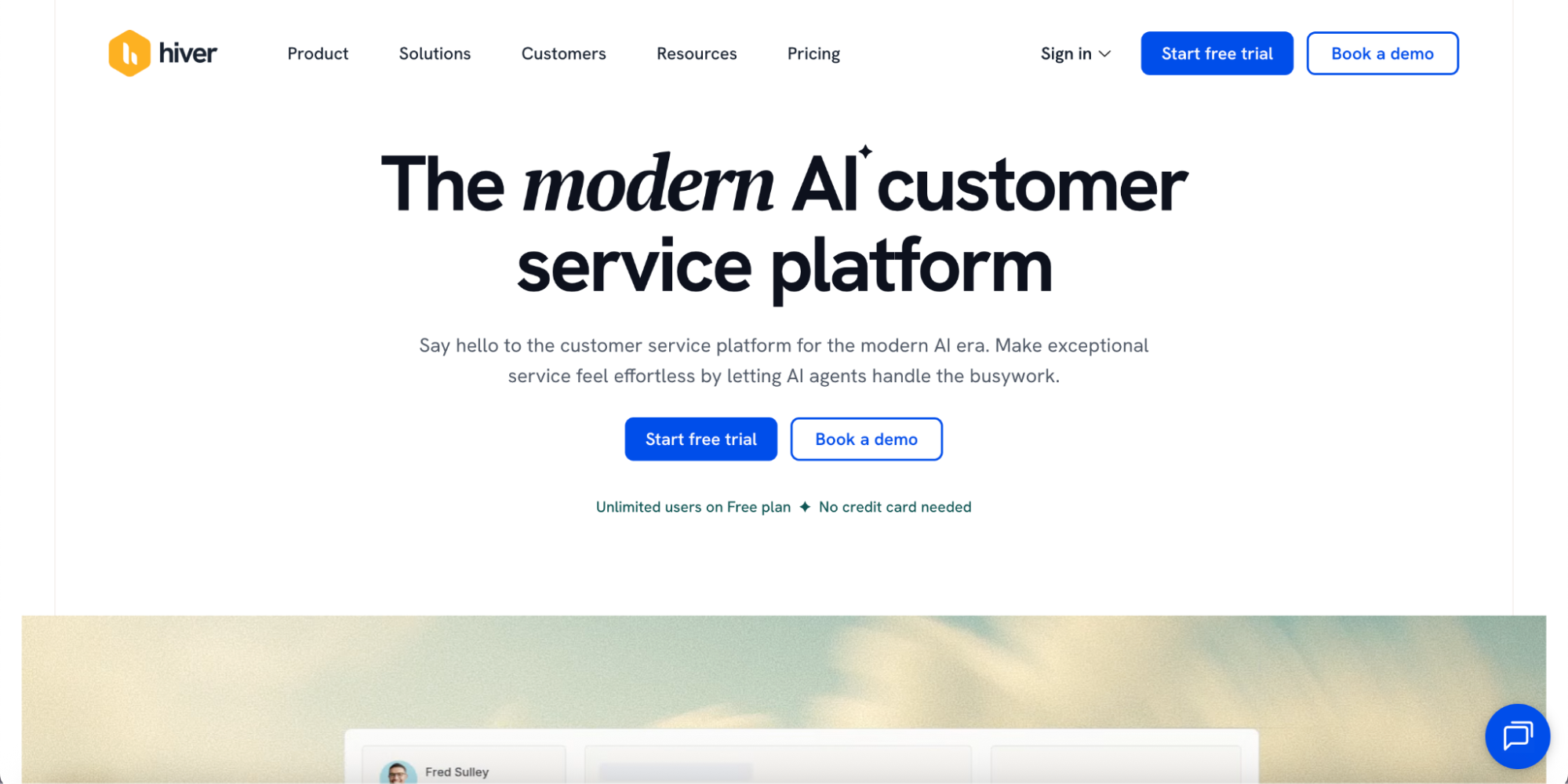
Hiver turns Gmail into a customer service hub where teams can manage shared inboxes right from their email interface. This solution offers a fresh alternative to traditional helpdesk platforms by keeping all operations within your inbox.
Hiver key features
- Shared inbox management directly within Gmail
- Email delegation and assignment tracking
- Internal notes for team communication
- Automation rules for routing and prioritization
- Analytics on response times and team performance
Hiver pros and cons
Pros:
- Smooth Gmail integration with minimal learning curve
- Reliable collision detection to prevent duplicate replies
- Shared tools including internal notes and @mentions
- Clear visibility into email assignments and status
Cons:
- Limited reporting customization options
- Works with Gmail/Google Workspace only
- Simple automation compared to specialized platforms
- Search function sometimes shows irrelevant results
Hiver pricing
Plan | Monthly Price (Annual Billing) |
Growth | $25 per user |
Pro | $45 per user |
Elite | $75 per user |
Hiver best for
Small to medium businesses can benefit from Hiver's optimized communication without investing in complex helpdesk support systems. Teams managing shared email addresses like support@ or info@ will find great value in Hiver's Gmail-based solution.
Hiver free trial details
Users can access all Elite plan features through a 7-day free trial without providing credit card details.
12. SAAS First

SAAS First delivers a complete AI-driven customer support platform that makes managing conversations simple in channels of all types. This help desk solution stands out with straightforward pricing and caters to small and medium-sized SaaS businesses.
SAAS First key features
- Omnichannel Inbox - Brings together all customer conversations from email, live chat, and social media in one place
- AI Chatbot Integration - Milly handles routine questions automatically and provides 24/7 customer support
- Knowledge Base - Customers can find answers on their own through self-service options
- CRM Integration - The platform makes customer account management quick with predefined actions
- Live Analytics - Shows customer behavior patterns and support team performance
SAAS First pros and cons
Pros:
- User-friendly design that needs minimal training
- AI helps deliver faster customer support
- One view of your customer's complete history
- AI chatbot comes at no extra cost
Cons:
- Higher-tier plans are needed for advanced marketing features
- Customization options are nowhere near enterprise solutions
- The platform is new with a growing integration ecosystem
- Advanced reporting options could be better, according to some users
SAAS First pricing
The platform uses a single plan at $9.00 per team member monthly that has all customer engagement features. Each member gets 100 SAAS Credits per month (worth $9 USD). Extra credits cost $0.09 each for additional usage.
SAAS First best for
Small and medium-sized SaaS companies that want better customer relationships will find SAAS First valuable. The platform works great for businesses looking to combine multiple support channels without dealing with complex pricing.
SAAS First free trial details
You can try all modules free for 14 days without a credit card. The trial comes with every feature, onboarding templates, 100 SAAS Credits, and team invites.
13. Tidio
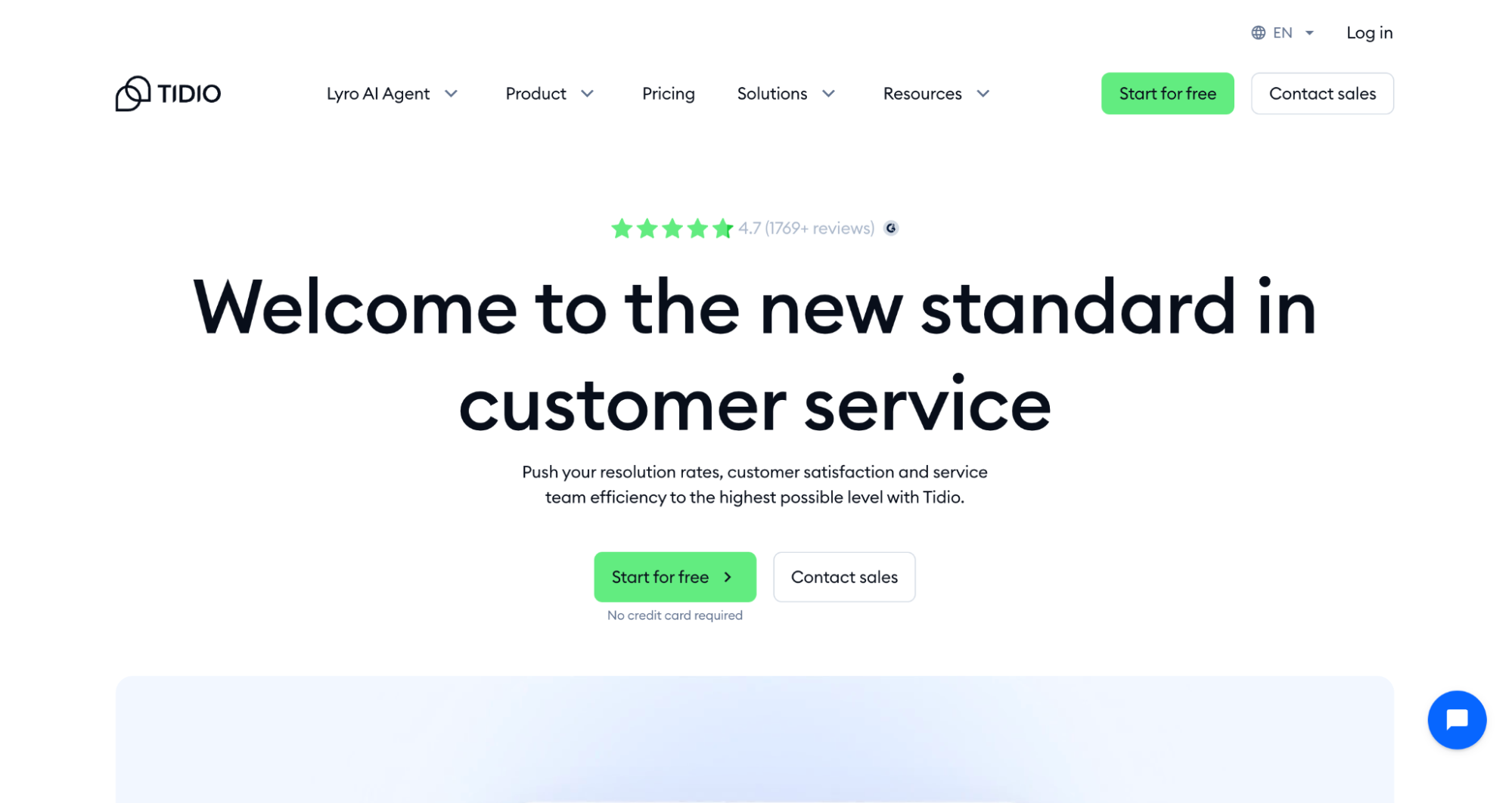
Tidio helps businesses connect with customers through a platform that combines live chat, AI agents, and multichannel support. This help desk software solution brings all customer interactions from websites, social media, and email into a single dashboard.
Tidio key features
- Lyro AI Agent - Handles up to 67% of repetitive customer queries automatically
- Live Chat - Lets you chat with visitors in real-time with typing preview and customer context
- Flows - Creates automated pathways that trigger at key moments in a customer's experience
- Multichannel Support - Manages conversations from website, Facebook, Instagram, and WhatsApp
- Analytics Dashboard - Shows live metrics for team members, AI, and automation
Tidio pros and cons
Pros:
- Accessible interface that needs minimal technical skills
- Strong automation capabilities for 24/7 support
- Detailed visitor tracking and engagement tools
- Single inbox for all customer communications
Cons:
- Plans can get pricey as conversation volume grows
- Some users report delays in message notifications
- Limited customization compared to enterprise alternatives
- Mobile app runs slower than desktop version
Tidio pricing
Plan | Monthly Cost |
Free | $0 (50 conversations/month) |
Starter | $24.17/month |
Growth | From $49.17/month |
Plus | From $749.00/month |
Premium | Custom pricing |
Tidio best for
Small businesses and ecommerce stores that want real-time customer engagement will find Tidio particularly useful. The platform works well for companies looking to automate routine support tasks without complex setup.
Tidio free trial details
The platform offers a 7-day free trial with access to all premium features. No credit card is needed. Your account switches to the free plan with 50 monthly conversations after the trial ends.
14. SuperOps

SuperOps combines PSA and RMM into a single platform. MSPs and IT teams get full control over their service operations through this cloud-based help desk software. This helpdesk software platform optimizes operations by integrating endpoint management with service desk functions.
SuperOps key features
- Unified Dashboard - Displays device status, open tickets, and alerts in one interface
- Automated Ticketing - Creates and assigns tickets when issues are detected
- Asset Management - Tracks hardware and software across all managed devices
- AI-Powered Insights - Uses Monica AI to assist with ticket classification and response suggestions
- Policy Management - Allows configuration at client, site, and device levels
SuperOps pros and cons
Pros:
- User-friendly, modern interface needs minimal training
- Powerful automation tools reduce routine work
- Up-to-the-minute data analysis provides useful insights
- Strong PSA capabilities simplify business processes
Cons:
- Small teams with few endpoints may face higher costs
- Competitors offer more customization options
- Advanced functions require time to master
- Integration ecosystem continues to grow
SuperOps pricing
Plan | Annual Price (per tech/month) |
Standard PSA | $79 |
Standard RMM | $99 |
Pro (Unified Basic) | $129 |
Super (Unified Advanced) | $159 |
SuperOps best for
Mid-sized MSPs and IT teams managing dozens to hundreds of endpoints benefit most from SuperOps. Organizations moving from separate tools to a unified system find the platform particularly valuable.
SuperOps free trial details
Users can evaluate all features through a 14-day free trial without a credit card. This helps teams make informed decisions before subscribing.
15. BoldDesk
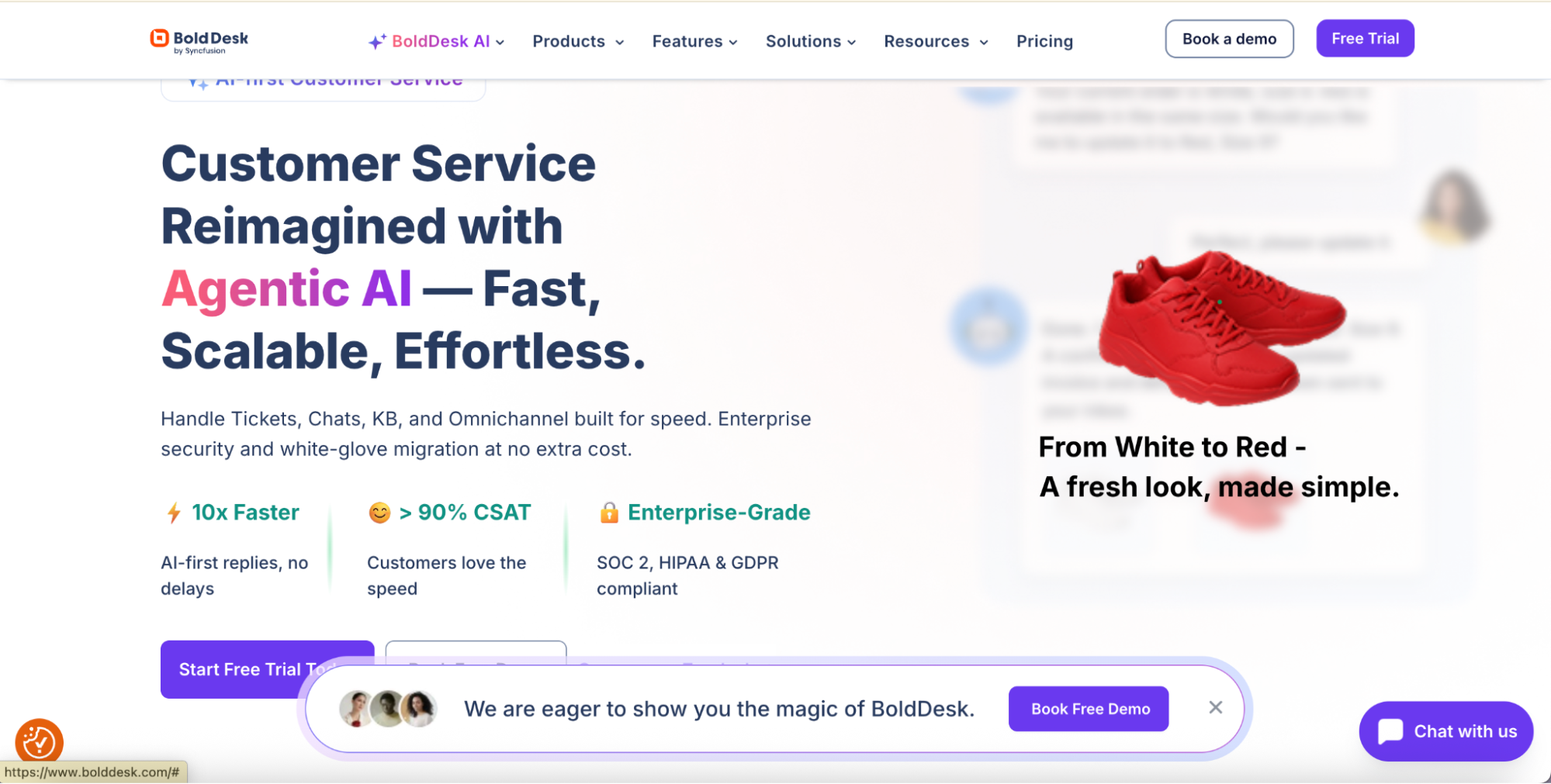
BoldDesk is a flexible and modern help desk software built to simplify customer support without the enterprise-level complexity. It combines ticketing, automation, and omnichannel support under one intuitive interface. Designed by the team behind Syncfusion, BoldDesk is gaining traction for its affordability and depth of features that rival long-established players.
BoldDesk key features
- Omnichannel Ticketing: Convert requests from email, chat, web forms, and social media into a single, organized ticketing system.
- Smart Automation: Streamline workflows with rules for assignments, SLAs, escalations, and approvals.
- Self-Service Knowledge Base: Build branded customer portals with FAQs and articles to reduce ticket volume.
- Customizable Dashboards: Get real-time insights into ticket performance, agent workload, and satisfaction scores.
- AI-Powered Assistance: Leverage AI to auto-categorize tickets, suggest responses, and improve resolution speed.
BoldDesk pros and cons
Pros
- Feature-rich yet affordable compared to legacy tools.
- Highly customizable interface — ideal for multi-brand setups.
- Responsive and helpful customer support team.
Cons
- Some integrations are limited compared to bigger players.
- Advanced automation features available only in higher tiers.
- Initial setup can take time for non-technical users.
BoldDesk pricing
Plan | Price (per agent/month) | Highlights |
|---|---|---|
Scale | $12 | Ticketing, automation, custom fields, knowledge base |
Momentum | $25 | Includes live chat, social channels, AI options |
Enterprise | $39 | Adds HIPAA compliance, ticket approvals, and multi-brand support |
BoldDesk best for
Teams that want a modern, scalable help desk solution without paying enterprise prices. Perfect for SMBs, startups, and growing teams looking to automate support while maintaining flexibility.
BoldDesk free trial details
15-day free trial — no credit card required.
16. SysAid

SysAid delivers flexible IT Service Management with both cloud and on-premises deployment options, making it a powerful help desk solution for streamlining service operations. Teams can handle tickets, manage assets, and automate workflows effortlessly—making it suitable for organizations of all sizes.
SysAid key features
- AI help desk with intelligent ticket categorization and case summarization
- Self-service portal with custom forms and knowledge base access
- Asset monitoring with up-to-the-minute visibility and CMDB integration
- Ticket trip tracking for complete audit trails
- Workflow designer for customized process automation
SysAid pros and cons
Pros:
- Cloud or on-premises deployment options
- ITIL-aligned processes for best practices
- Strong automation features reduce manual tasks
- Detailed asset management and tracking
Cons:
- Some sections have an outdated interface
- Workflow disruptions from occasional bugs
- New users face a steep learning curve
- Competitors offer better reporting options
SysAid pricing
SysAid comes in three main pricing tiers:
- Help Desk: $79/user/month - Simple ticketing needs
- ITSM: $108/user/month - Advanced service management
- Enterprise: Custom pricing - Complex environments
SysAid best for
Mid-sized to large organizations with complex IT environments will find SysAid particularly useful. The platform shines when businesses need unified asset management that works directly with helpdesk features.
SysAid free trial details
The 14-day free trial provides access to all SysAid features without a credit card. You get enough time to review the platform before making a decision.
17. HubSpot Service Hub

HubSpot Service Hub is a full-fledged help desk software built on top of the popular HubSpot CRM, designed to give service teams a unified view of customers and seamless handoffs between sales, marketing and support. It brings together ticketing, live chat, knowledge base, automation and feedback tools under one roof—making it a good choice if you’re already using or planning to use HubSpot’s ecosystem.
HubSpot Service Hub key features
- Shared Inbox & Ticketing: Centralize emails, chats and support requests into one hub for easier tracking and prioritization.
- Knowledge Base & Self-Service Portal: Create a searchable help centre so customers can find answers themselves, reducing support load.
- Automations & Workflows: Set up ticket routing, SLA enforcement, status changes and follow-up actions to streamline support operations.
- Feedback & Surveys: Gather CSAT, NPS and CES data directly in the platform to measure customer satisfaction and improve service quality.
- CRM Integration & Reporting: Because it lives in HubSpot, you get cross-team data, full customer history and unified dashboards for sales + service alignment.
HubSpot Service Hub pros and cons
Pros
- Seamless integration with HubSpot’s CRM, marketing & sales tools — no data silos.
- Good self-service and feedback features help improve customer experience and reduce repeat tickets.
- Strong reporting and analytics capabilities especially useful for aligning service with business metrics.
Cons
- Help desk-specific features are less mature compared to dedicated support platforms (some users report limitations).
- Price jumps significantly when moving from basic to professional/enterprise tiers.
- Because it’s part of the broader HubSpot suite, you may end up paying for features you don’t need or using only a subset of the system.
HubSpot Service Hub best for
Companies already using or planning to use HubSpot for marketing or sales, and who want to align support with those functions. Also suitable for service teams that value a unified CRM-support environment over standalone help desk tools.
HubSpot Service Hub free trial & pricing
Free Trial: HubSpot offers free tools for Service Hub (including shared inbox, basic ticketing and chat) so you can begin without cost.
Plan | Price (per seat/month, annual billing) |
|---|---|
Free Tools | $0 (up to 2 users) |
Starter | Starts at ~$9-$15/seat/month |
Professional | Starts at ~$90-$100/seat/month |
Enterprise | Starts at ~$150/seat/month (10-seat minimum) |
18 Jira Service Management

Jira Service Management, built by Atlassian, is a powerful help desk software tailored for IT, HR, and operations teams. It brings IT Service Management (ITSM) principles into an agile, collaborative environment—making it ideal for organizations that want deep integration with DevOps workflows and Jira Software. From ticketing and automation to incident management, it’s designed to keep service delivery fast, visible, and efficient.
Jira Service Management key features
- ITSM-Ready Ticketing: Manage requests, incidents, and changes with clear workflows and SLAs.
- Automation & Rules Engine: Automate repetitive actions, status changes, and assignments based on smart conditions.
- Self-Service Portal: Empower employees and customers with an easy-to-use, searchable knowledge base.
- Change & Incident Management: Connect development and operations teams to resolve issues quickly with full visibility.
- Native Jira Integration: Sync seamlessly with Jira Software for complete lifecycle management—from issue detection to deployment.
Jira Service Management pros and cons
Pros
- Tight integration with Jira and the entire Atlassian ecosystem.
- Advanced automation, analytics, and customizable workflows.
- Scalable and secure—suited for ITSM and enterprise environments.
Cons
- Can be complex for non-technical users or smaller teams.
- Some advanced ITSM features locked behind higher-tier plans.
- Steeper learning curve for first-time Jira users.
Jira Service Management best for
IT teams, technology startups, and agile organizations that need a robust, ITSM-grade help desk solution integrated with their existing Jira and DevOps workflows.
Jira Service Management pricing
Plan | Price (per agent/month) |
|---|---|
Standard | $19.04 |
Premium | $47.82 |
Enterprise | Custom Pricing |
19. Front

Front reimagines customer support by turning your shared inbox into a full-fledged help desk software. Instead of traditional ticket numbers, it keeps the human touch alive — letting teams manage customer conversations directly from email, chat, or social channels while collaborating behind the scenes.
Front key features
- Shared Inbox Collaboration: Centralize customer emails, chats, and messages into one place with internal comments and assignments.
- Workflow Automation: Automatically route messages, set response deadlines, and tag conversations to streamline repetitive tasks.
- Omnichannel Support: Connect email, live chat, SMS, and social channels for real-time visibility across all touchpoints.
- Analytics & SLAs: Track response times, workloads, and customer satisfaction metrics to measure performance effectively.
- CRM & App Integrations: Connect with tools like HubSpot, Salesforce, and Slack for a unified customer view.
Front pros and cons
Pros
- Keeps customer conversations personal — no ticket IDs or robotic tone.
- Excellent collaboration tools for shared inboxes and internal alignment.
- Smooth integration with popular CRMs and communication tools.
Cons
- Lacks deep ITSM or enterprise-level automation.
- Pricing can get steep as your team grows.
- Limited customization compared to full-scale help desk platforms.
Front best for
Support, sales, and account management teams that want a collaborative, email-centric help desk solution focused on fast, personal, and organized customer communication.
Front pricing
Plan | Price (per seat/annual) | Price (per seat/month) |
|---|---|---|
Starter | $25 | $35 |
Professional | $65 | $85 |
Enterprise | $105 | only available on annual |
Front free trial details
Free 7-day trial available — no credit card required
20. InvGate Service Management

InvGate Service Management blends easy-to-use design flexibility with built-in AI capabilities. Teams can resolve problems faster and scale their service operations without effort.
InvGate Service Management key features
- AI-powered ticket summaries that highlight critical information
- Virtual Service Agent for Microsoft Teams and WhatsApp support
- Visual workflow editor with card-style builder
- AI-assisted Knowledge Article generation from resolved tickets
- Pre-built workflow templates for common IT processes
InvGate Service Management pros and cons
Pros:
- Easy-to-use, flexible interface
- Strong customization without coding knowledge
- Quick deployment - ready to use in under an hour
- Powerful automation and AI capabilities
Cons:
- Small teams might find it overwhelming
- Advanced features take time to master
- Complex adaptations have limited customization options
- Simple IT asset lifecycle management features
InvGate Service Management pricing
Plan | Price |
Starter | $17/agent/month |
Pro | $40/agent/month |
Enterprise | Custom pricing |
InvGate Service Management best for
Mid-sized to large organizations benefit most from InvGate Service Management. The platform works well in finance, healthcare, education, and government sectors.
InvGate Service Management free trial details
Users get complete access with a 30-day free trial. No credit card needed.
21. Desk365

Desk365 is a cloud-based help desk software solution built specifically for businesses that use Microsoft 365. It helps support teams manage tickets, automate workflows, and collaborate effortlessly within Microsoft Teams and Outlook.
Desk365 is ideal for organizations that want a lightweight, affordable, and easy-to-adopt support solution without leaving their familiar Microsoft workspace.
Desk365 key features
- Microsoft 365 & Teams Integration: Manage support tickets directly from Microsoft Teams or Outlook without switching apps.
- Smart Ticketing System: Convert customer emails and chats into tickets, automate categorization, and track SLAs in one dashboard.
- Self-Service Portal: Create a branded knowledge base to help customers find instant answers and reduce ticket load.
- Workflow Automation: Automate repetitive processes like ticket assignments, approvals, and notifications.
- Custom Reports & Dashboards: Track team performance, customer trends, and SLA compliance through visual reports.
Desk365 pros and cons
Pros
- Deep, native integration with Microsoft 365 and Teams.
- Intuitive interface that’s easy to set up and manage.
- Affordable and lightweight — great for SMBs.
Cons
- Limited third-party integrations beyond Microsoft ecosystem.
- Not ideal for large enterprises with complex ITSM needs.
- Some automation features less advanced compared to bigger platforms.
Desk365 best for
Small to mid-sized businesses that rely on Microsoft 365 and want a simple, affordable help desk solution integrated directly into their everyday tools.
Desk365 pricing
Plan | Price (per agent/month), billed annually | Price (per agent/month), billed monthly |
|---|---|---|
Standard | $12 | $16 |
Professional | $20 | $25 |
Desk 365 free trial details
Free 14-day trial available — no credit card required.
Small business helpdesk software
Now that we’ve explored the best help-desk software overall, let’s specifically focus on the help desk software for small businesses.
For small businesses and growing startups, finding the right affordable help desk software can be challenging. You need a solution that’s powerful enough to manage customer queries but simple and affordable for lean teams. This section highlights tools specifically suited for SMBs, making it easier to choose the right service desk software for small business needs.
Top small business helpdesk software
Here are some of the top rated affordable help desk software for small business from our 21-helpdesk roundup, optimized to help small teams streamline support and delight customers.
- SparrowDesk
An AI-powered small business help desk software that can auto-resolve up to 60% of queries. It features an omnichannel inbox, SLAs, and a self-service knowledge base, helping small teams deliver fast, reliable support.
Support that scales with small businesses
- Freshdesk
A flexible service desk software for small business, supporting email, chat, phone, and social channels. Its AI assistant “Freddy” reduces response times with smart suggestions. - Zoho Desk
Cost-effective and customizable, Zoho Desk integrates well with other Zoho apps. Features include AI-powered suggestions, SLA tracking, and a customer self-service portal ideal for SMBs seeking reliable small business help desk software. - Help Scout
A lightweight service desk software for small business focused on email-centric workflows. It offers shared inboxes and automation, making it easy for small teams to manage support efficiently. - Tidio
Perfect for small e-commerce businesses, Tidio combines live chat and AI chatbots to handle multiple channels. It’s a budget-friendly small business help desk software for automating frequent queries.
These platforms are some of the top rated help desk software for small business, carefully selected to help small teams streamline support, improve response times, and deliver exceptional customer experiences without the overhead of complex systems.
What the best help desk software actually does — and why you need it now
Think of your email inbox as a messy pile of papers on your desk. Help desk software is the filing cabinet that keeps everything organized. Every customer question — whether it comes through email, chat, or social media — gets turned into a trackable ticket your team can manage efficiently.
The difference between the best help desk software and just using email? Structure. Instead of hunting through endless message threads, everything is organized in one place where your team can see what needs attention, who's working on what, and what’s already resolved.
Here’s what these systems do:
- Ticket management: Track every request without missing a beat.
- Automation: Handle repetitive tasks automatically so agents can focus on solving problems.
- Reporting: Get insights on performance, ticket volume, and customer satisfaction.
- Knowledge bases: Let customers help themselves, reducing repetitive queries.
- Omnichannel integration: Connect all communication channels for a seamless experience.
There are different types of help desks to suit your needs:
- Customer service help desks: For external customer support.
- Internal help desks: Manage employee requests.
- IT help desk software: Solve technical problems across your organization.
- Cloud-based platforms: Hosted on the vendor’s servers.
- Self-hosted options: Run on your own infrastructure.
- Open-source platforms: Fully customizable.
- Enterprise solutions: Handle complex workflows with advanced customization.
Your choice depends on who you’re supporting, where your data lives, and how much customization you need.
But the benefits go beyond organization. Everything stays in one searchable place. When a customer reaches out months later, your team can quickly reference past interactions. Agents can share templates, leave private notes, and track who’s doing what.
Customer service automation is a game-changer. Routine tasks like routing tickets, sending acknowledgment emails, and updating statuses happen automatically, freeing your team to focus on real problem-solving.
"The most effective help desk software does more than resolve tickets — it facilitates memorable customer experiences, empowers support teams, and helps organizations build lasting trust"
- Amanda Nelson, Senior Director of Customer Experience, salesforce
The best help desk software scales with you. Handling 10 tickets or 100, the quality of support remains consistent. Adding new team members is easy, thanks to straightforward onboarding features.
Security is built-in. Role-based permissions, user authentication, and secure data handling ensure that agents only see what they need to see.
Reporting tools give you actionable insights. Track ticket volume, resolution times, customer satisfaction, and agent performance — all the data you need to make smart support decisions.
Why does this matter now? Customer expectations are higher than ever:
- 86% of service professionals say expectations are rising.
- 77% of customers expect immediate help when they reach out.
Modern help desk software lets you meet these expectations. Customers want to connect through phone, email, chat, or social media. The right platform keeps every conversation connected, no matter where it started.
AI is taking support to the next level. Machine learning analyzes interactions, predicts customer needs, and suggests solutions. Faster responses and more accurate answers mean happier customers and more efficient agents.
When evaluating help desk software, look for systems that:
- Integrate with your existing tools.
- Support remote teams.
- Scale effortlessly as you grow.
The best help desk software doesn’t just organize tickets — it empowers your team to build stronger relationships with customers.
What to look for in help desk software that actually works

Shopping for the best help desk software feels a bit like buying a car — you need to know what features matter before you get lost in all the bells and whistles. Whether you're managing customer requests or using internal help desk software to support employees, the same principles apply.
We've seen too many teams pick platforms based on flashy demos, only to realize they're missing the basics that make support work smoothly.
Here's what separates the good platforms from the ones that'll make your life harder.
Ticket management that doesn't fight you
Think of it like this: if tickets are the heart of your help desk, the management system is what keeps that heart beating. You want support ticketing software that turns every customer email, chat, or call into a trackable ticket without you having to think about it.
The smart systems include customizable templates for faster responses and separate queues for different team members. Look for collision detection too — that's the feature that stops two agents from working on the same ticket and stepping on each other's toes.
Automation makes the real difference. Good platforms automatically route tickets to the right person, flag urgent issues, and send those "we got your message" replies instantly. Your team gets to focus on actually helping people instead of shuffling digital paperwork.
Omni-channel support that makes sense
Your customers don't care about your internal systems — they just want help through whatever channel feels easiest to them.
The platforms worth considering pull together email, phone, chat, social media, and website forms into one dashboard. Everything becomes a ticket, but the system remembers where it came from and keeps all the context intact. No more hunting through different apps to figure out what a customer said three messages ago. The same goes for internal help desk software, where employees can raise requests across channels and IT or HR teams can manage them from one place.
Email should handle unlimited inboxes, phone integration needs call recording and routing, and chat should work both with live agents and AI helpers for after-hours questions.
Self-service that actually helps
Here's something interesting: 91% of customers would use a knowledge base if it was built for their specific needs. Even better — about half of all support tickets are questions people could answer themselves with the right information.
Smart knowledge bases don't just store articles. They suggest relevant content based on what customers are asking, which means fewer tickets hit your queue in the first place. The best ones track which articles work and which ones need fixing.
Reports that tell you useful things
Data matters, but only if it helps you make better decisions. Good reporting shows you the stuff that actually impacts your support quality — response times, resolution speed, and whether you're hitting your service goals.
You want dashboards that highlight top performers and spot coaching opportunities, plus customer satisfaction scores that tell you if your changes are working. The ability to schedule reports and send them automatically saves you from manual busywork.
Permissions that keep things secure
Not everyone needs access to everything. Most platforms offer admin, agent, and viewer roles, but the good ones let you get granular about what each person can view, add, edit, or delete.
This isn't just about security — it's about keeping workflows clean and making sure people only see what they need to do their jobs well.
The right help desk software feels like it was built for how your team actually works, not how some product manager thinks support should happen.
Types of help desk software available today

You've got different models for different needs — some are built for speed, others for hauling cargo, and some are the ideal support ticketing software solutions that get you from point A to point B without breaking the bank.
Cloud-based vs on-premise
Cloud-based help desk software lives on someone else's servers, and you access it through your web browser. No servers to maintain, no IT headaches when things go wrong — the vendor handles all that stuff. You pay monthly, get updates automatically, and your team can jump in from anywhere with an internet connection.
The trade-off? You're trusting another company with your data and depending on their uptime. But for most businesses, that's a pretty good deal. Small teams especially love cloud solutions because there's no big upfront cost or IT setup required.
On-premise software means you buy it, install it on your own servers, and take care of everything yourself. Your IT team becomes responsible for updates, security patches, and keeping the lights on. It's more work, but you get complete control over your data and can customize things exactly how you want.
Most smaller businesses go with cloud options — they're just easier. Bigger companies with serious IT teams and specific security requirements sometimes prefer keeping everything in-house.
Open-source vs proprietary
Open-source help desk software gives you the source code, which means you can peek under the hood and modify anything you want. No licensing fees, complete freedom to customize, and you're not locked into one vendor's way of doing things.
The catch? You need someone who knows how to code. When something breaks, you're looking at community forums and documentation instead of calling customer support.
Proprietary software keeps the code locked up, but you get professional support, regular updates, and interfaces designed for regular humans. The companies behind these tools have entire teams focused on making them work well and helping customers when they don't.
Your choice comes down to whether you have technical folks who can handle the DIY approach or if you'd rather pay for someone else to worry about the technical stuff.
ITSM vs customer support help desks
IT Service Management help desks are built for handling internal tech support — think employee laptop problems, server issues, and software requests. These systems follow frameworks like ITIL and include features for tracking company assets, managing changes to IT systems, and handling complex workflows. In these setups, IT help desk software acts as the central hub for managing incidents, automating repetitive IT tasks, and ensuring that internal teams stay productive with minimal downtime.
Customer support help desks focus on helping your actual customers. They're designed around helpdesk software features like knowledge bases, satisfaction surveys, and connecting with customers across email, chat, and social media.
Some platforms try to do both, but specialized tools usually work better for their intended purpose. If you're mainly helping customers, you want something built for that. If you're running IT support for your company, ITSM features matter more.
The right choice depends on who you're supporting and what kind of problems you're solving. Different tools for different jobs — just like you wouldn't use a hammer to fix a computer.
How to choose the best help desk software for your business
Picking the best help desk software solution shouldn't feel like guesswork. You need something that actually fits how your team works — not the other way around.

Figure out your team size and support volume
Your team size tells you a lot about what you need. Small teams handling maybe 20-30 tickets a day? Lightweight solutions work great without all the bells and whistles that'll just confuse everyone. But if you're dealing with hundreds of tickets and multiple agents, you need something with serious routing and automation muscle.
Ask yourself these questions:
- How many agents will use the software?
- What's your average daily ticket volume?
- Do you need to separate tickets by department or specialty?
Growing fast? Make sure whatever you pick can grow with you without breaking your workflow. Some teams need multi-tier support structures — like having different people handle billing vs. technical issues.
Think about your communication channels
Your customers aren't all going to email you. Different types of customers prefer different channels. Some prefer chat, others call, and plenty will hit you up on social media. The trick is finding software that pulls all these conversations into one place where your team can actually manage them.
Consider which channels matter for your business:
- Email and web forms
- Live chat and messaging
- Phone support
- Social media platforms
- Self-service portals
Think of it like this: if each channel is a different door into your business, your best help desk software should be the lobby where everything gets organized. You want all those conversations turning into trackable tickets while keeping the context intact.
Check what connects to what
Your help desk doesn't live in a bubble. It needs to play nice with your other tools, or you'll end up with a mess of disconnected information.
Look for connections with:
- CRM systems for customer data sharing
- Project management tools for issue tracking
- E-commerce platforms for order context
- Communication tools like Slack or Microsoft Teams
When these systems talk to each other, your agents can see the full customer picture without jumping between five different apps. If you need something custom, make sure the platform has API access for building your own connections.
Make sure it can grow and bend
Your business won't stay the same size forever, and your processes will evolve. Cloud-based solutions usually make scaling easier — you can add more agents without buying new servers.
Look for customization options like:
- Customizable ticket forms and fields
- Flexible automation rules
- Adjustable user permissions and roles
- Tailored reporting dashboards
Role-based permissions matter more than you might think — you don't want everyone having access to everything. Good workflow customization lets you automate the boring stuff and route tickets exactly how your business works.
Here's the thing: get your support team involved in testing. They're the ones who'll be using it every day, and they'll spot problems you might miss. Find a customer support tool that handles what you need today while leaving room for tomorrow's growth
Top 21 help desk solutions at a Glance
A quick overview of the most reliable, easy-to-use, and feature-rich help desk software tools that can streamline your customer support.
Name | AI Capabilities | Best For | Trial Info |
|---|---|---|---|
SparrowDesk | Luna AI Agent (up to 60% auto-resolution), AI Copilot for agents with summaries and suggested replies | Growing teams and SMBs seeking affordable, AI-powered omnichannel support | 14-day free trial |
Zendesk | AI Agents handle 80%+ of service interactions, reduces resolution times | Large enterprises with dedicated admins managing high volumes across multiple channels | 14-day free trial (no credit card) |
Freshdesk | Freddy AI Copilot suggests responses, flags sentiment, cuts response time by up to 40% | Small, mid-sized, and enterprise businesses handling high volumes across different channels | 14-day free trial (no credit card) |
Zoho Desk | Zia AI assistant for sentiment analysis and ticket tagging | Small to mid-sized businesses needing automation and multichannel support, especially Zoho users | 15-day free trial (no credit card) |
Help Scout | AI Answers, AI Drafts, AI Summarize, AI Assist | Growing SaaS and ecommerce businesses needing straightforward, personalized customer support | 15-day free trial (no credit card), 3-month free AI Answers trial |
Intercom | Fin AI Agent with customized instant replies | SaaS companies, e-commerce platforms, and startups needing AI automation with immediate engagement | 14-day free trial (no credit card) |
HappyFox | Not specified | Agile teams and growing organizations needing scalable support with advanced automation | Not specified |
LiveAgent | AI chatbot and answer assistant capabilities | Businesses needing multichannel support management (chat, email, calls, social media) | 30-day free trial (no credit card, 14 days for personal email) |
Monday Service | AI Ticket Triage for classification, sorting, and routing | Teams already using monday.com ecosystem wanting unified workflows | 14-day free trial (no credit card) |
Salesforce Service Cloud | Agentforce AI with conversational, predictive AI handling 80%+ interactions | Large enterprises in regulated industries (telecom, financial services, healthcare) | 30-day free trial (no credit card) |
Hiver | Not specified | Small to medium businesses managing shared email addresses within Gmail/Google Workspace | 7-day free trial (no credit card) |
SAAS First | Milly AI chatbot handles routine questions automatically, provides 24/7 support (included free) | Small and medium-sized SaaS companies wanting combined support channels | 14-day free trial (no credit card) |
Tidio | Lyro AI Agent handles up to 67% of repetitive queries automatically | Small businesses and ecommerce stores wanting real-time engagement and automation | 7-day free trial (no credit card) |
SuperOps | Monica AI assists with ticket classification and response suggestions | Mid-sized MSPs and IT teams managing dozens to hundreds of endpoints | 14-day free trial (no credit card) |
BoldDesk | AI-powered assistance for auto-categorizing tickets, suggesting responses, improving resolution speed | SMBs, startups, and growing teams wanting modern, scalable help desk without enterprise prices | 15-day free trial (no credit card) |
SysAid | AI help desk with intelligent ticket categorization and case summarization | Mid-sized to large organizations with complex IT environments needing unified asset management | 14-day free trial (no credit card) |
HubSpot Service Hub | Not specified (focuses on automation and workflows) | Companies using or planning to use HubSpot for marketing/sales, wanting CRM-support alignment | Free tools available |
Jira Service Management | Not specified (focuses on automation and rules engine) | IT teams, technology startups, and agile organizations needing ITSM integrated with DevOps | Not specified |
Front | Not specified (focuses on collaboration and workflow automation) | Support, sales, and account management teams wanting collaborative, email-centric help desk | 7-day free trial (no credit card) |
InvGate Service Management | AI-powered ticket summaries, Virtual Service Agent for Teams/WhatsApp, AI-assisted Knowledge Article generation | Mid-sized to large organizations in finance, healthcare, education, and government sectors | 30-day free trial (no credit card) |
Desk365 | Not specified | Small to mid-sized businesses relying on Microsoft 365 wanting integration into everyday tools | 14-day free trial (no credit card) |
Wrapping this up
Here's the thing about help desk software — it's not just another tool you're buying. It's the foundation of how your customers experience your brand when they need help most.
After curating this help desk software list and evaluating key features, one platform stands out for modern businesses looking for efficiency, affordability, and ease of use: SparrowDesk. It’s designed to simplify support, automate repetitive tasks, and deliver a seamless experience for your team and customers.
Next Steps:
- Explore SparrowDesk’s features and see how it fits your workflow.
- Sign up for a free trial and experience the setup firsthand.
Discover a simpler way to manage support
The best help desk software is the one that fits your team's workflow and grows with your business.
FAQs
CONTENTS

Choosing a help desk? Try SparrowDesk
Try Sparrowdesk free for 14 days

Support made easy. So your team can breathe.





